By Neo Kolane
The High Court of Lesotho has ordered the preservation of Lekokoaneng-based Lesotho Stone Enterprises’ assets, which include bank accounts, and place them under curatorship pending investigations of fraud and money laundering.
Junwei Wang of Bloemfontein, South Africa was appointed curator of Lesotho Stone Enterprise last Friday temporarily following a case that was reported two years ago but not looked into.
Lesotho Stone Enterprises (PTY) LTD is the largest quarry of natural sandstone building products in Southern Africa, cut from the finest sandstone resources in the Kingdom of Lesotho.
The quarry had four directors, Long Denggao, Pan Huang, Zhei Fengu of Asian origin, and an unnamed Lesotho national, all of whom are suspected to have been involved in corruption and obtaining a mining lease illegally. The four are also alleged to have been involved in fraud, money laundering and bribery of high ranking officials.
The director general of Directorate on Corruption and Economic Offence (DCEO), Mahlomola Manyokole, told the media today that after a long review of cases at his office, the case of Lesotho Stone Enterprise was considered very important, prompting DCEO, asset recovery office and prosecution to start working on it a month ago.
Manyokole also said this kind of corruption resulted in the government of Lesotho losing M40million, while the South African Reserve Bank has frozen about M3million after catching wind of suspicious transfers to China.
“In 2017 Lesotho Stone Enterprises applied for a mining lease which the ministry granted subject to an environmental impact assessment report from the ministry of tourism, which allows a company to operate at a certain area without hindering the lives of the people surrounding the place.
“The people around the quarry were complaining about the dust causing pollution at the area. There was an altercation that involved chiefs, councils and public servants. The quarry began operating in 2003 and everything was going fine, until they came to apply for a renewal of their lease, even though they had not complied with the conditions of the ministry of tourism. The mining board of mining, after receiving an EIA report, approves a lease application. Corruption began after coordinates revealed they were mining outside their perimeter, and had bribed government officials. The lease had been issued because the board was misled.
“We froze the bank accounts that the mine holds at Standard Lesotho Bank and First National Bank. There are also sites involved, that appear to have been bought from Lesotho Stone Enterprises. One is situated at Ha Matala and is registered under a Tśepiso Mofolo; the other one at Happy Villa appears to be owned by the Qhobela family.
“Everything bought with the money from Lesotho Stone Enterprises that had obtained a mining lease illegally was tainted. If no one comes forth with legitimate documents stating that the sites belong to them, the sites will be sold,” Manyokole said









